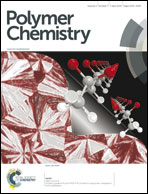Bioresorbable terpolymers based on l-lactide, glycolide and trimethylene carbonate with shape memory behaviour
Abstract
This paper presents the course of synthesis and the properties of biodegradable terpolymers obtained by ROP of L-lactide with glycolide, catalysed with zirconium(IV) acetylacetonate and conducted in the presence of a macroinitiator – trimethylene carbonate oligomers terminated with hydroxyl groups. The oligomers were also prepared by ROP reaction of TMC catalysed by zinc(II) acetylacetonate monohydrate in the presence of polyols as initiators. Depending on the type of initiator used, the oligomers had a linear or branched structure of the chain with different hydroxyl end-groups. Some of the obtained oligomers formed a network. The effect of the terpolymer chain structure on mechanical and thermomechanical properties as well as shape-memory behaviour was shown. The ability to control the speed of return from a temporary to a permanent shape, the value of stress of return triggered by this phenomenon, and the magnitude of the temperature range in which the phenomenon took place through appropriate selection of conditions for programming the temporary shape or/and terpolymer chain microstructure has been shown. The possibility of adjusting these parameters as presented in this paper is vital in the process of designing a bioresorbable material, which can be used for forming self-expanding stents or self-clamping surgical staples.


 Please wait while we load your content...
Please wait while we load your content...